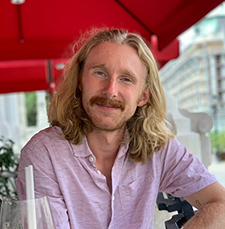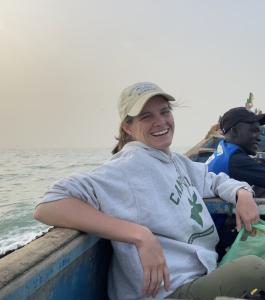SSRC Graduate Fellow Projects

Lautaro Cella, Political Science
In the last five years, Argentina and Chile have witnessed a surprising surge in anti-establishment views, protests, and votes for outsider candidates. What explains these unexpected outcomes in countries with ideologically distinct mainstream political alternatives? Using survey experiments, text-as-data analysis of campaign speeches, semi-structured interviews, and case studies, this dissertation examines the emergence of anti-establishment views and protest behavior in the Southern Cone. I argue that perceptions of generalized government underperformance in the form of repeated unsatisfactory economic performance and corruption largely drive anti-establishment attitudes and protest behavior. When confronted with multiple political alternatives that have previously been in power and performed disappointingly, voters will increase their anti-establishment views and express their discontent through different methods: participating in street demonstrations, casting an invalid ballot, and supporting outsiders. Moreover, I explore how outsiders can gain support by reminding the public of generalized government underperformance and stoking a combination of anger with existing parties and enthusiasm about blowing up the status quo. Previous studies have focused on the effects of policy convergence and the poor performance of a mainstream incumbent on anti-establishment views. However, they have overlooked the cumulative impact of multiple governing parties' performances on citizen dissatisfaction.

Enclosing several central nodes of the global fine art world, the EU hosts a growing number of social arts programs, where interactions with art often have the stated goal of enhancing democratic participation and social and environmental well-being through lay-person-led change. Based on 17 months of fieldwork with socially-engaged, independent arts groups in and around Athens, Greece, this dissertation project examines the ideologies of action and representation imminent in the complex and contested cultural policy ecologies of Europe, which (differently) posit arts and culture as salve for 'polycrisis'. The project deals with interactional and ethnographic data across a series of scales and sites, analyzing how the aesthetics and experience of art become figured as a site for social intervention, both speculative and normative, and how these interventions are understood by their putative publics. Drawing on insights from semiotic anthropology, the sociology of art (worlds), and the anthropology of ethics, Kuret theorizes the processes by which participatory art – as a constellation of practices, mediums, and genres vectorized as social action in socially-oriented intervention – engage (and produce) publics in crafting a collective good life. Across the five chapters, the project argues that understanding the particular images of good life intended by arts intervention requires attention to how local modes of expression are placed in relation to global categories and processes. It further attends to independant socially engaged art work which rejects the semiotic ideology that links art to political action, asking how the political economy of socially engaged art affects who and what types of projects are able to operate in Athens, where, unlike many other European cities due to long-term austerity, funding is limited at the state and municipal levels.

My project, Making Air Breathable in India: Experimental Ecologies of Clean Capitalism, examines how the
conception of the capitalist mode of production, and its attendant psychosocial dynamics, evolve, and
transform when the quintessential background condition of life, breathable air, becomes the foregrounding aspect for imagining habitable lives in contemporary India. Shrouded in an unbreathable atmosphere, 35 out of the 50 most polluted cities in the world are located in India. In the midst of environmental decay, India’s developmental challenges continue to escalate with rising absolute poverty and income inequality. Over the last decade, India’s “war on air pollution” has been solidified through changes in policy initiatives and foreign direct investments in ‘clean’ industrial and capital markets. These shifts have resulted in a proliferation of what I conceptualize as “clean air-tech”, economic and techno-experimental projects that promise to co-produce breathability and economic surplus. This study is based on 18 months of ethnographic and historical fieldwork that I conducted in India at clean air-tech startups, international conferences, research and development atmospheric science labs, and industrial factories. Taking “clean air-tech” industry as a key site of economic and technoscientific explication in this unprecedented ecological crisis era, I ask how the projects of producing breathable air, and the techno-epistemic, geopolitical, and economic strategies used to navigate breathlessness are made sense of by
bigger and smaller capitalists, atmospheric scientists, and industrial workers. Through this, my project examines the ways in which capitalism emerges as a mode of ecology-making and future-making in the face of immediate and constant ecological destruction and economic precarity.

Alex’s dissertation studies the long-run effects of civil unrest. Newly-digitized data from telephone directories show that neighborhoods impacted by the property destruction in the wake
of MLK’s assassination today have 75% fewer establishments than comparable neighborhoods. Neighborhoods in industrial cities never recover while neighborhoods in cities without a large manufacturing base recover. These empirical findings inform a dynamic quantitative spatial model of establishment location choice. Model estimates suggest that most of contemporary disinvestment is due to coordination challenges. These results suggest that concentrated ‘big push’ neighborhood revitalization policies are more effective than dispersed benefits.
Lautaro Cella, Political Science
In the last five years, Argentina and Chile have witnessed a surprising surge in anti-establishment views, protests, and votes for outsider candiates. What explains these unexpected outcomes in countries with ideologically distinct mainstream political alternatives? Using survey experiments, text-as-data analysis of campaign speeches, semi-structured interviews, and case studies, this dissertation examines the emergence of anti-establishment views and protest behavior in the Southern Cone. I argue that perceptions of generalized government underperformance in the form of repeated unsatisfactory economic performance and corruption largely drive anti-establishment attitudes and protest behavior. When confronted with multiple political alternatives that have previously been in power and performed disappointingly, voters will increase their anti-establishment views and express their discontent through different methods: participating in street demonstrations, casting an invalid ballot, and supporting outsiders. Moreover, I explore how outsiders can gain support by reminding the public of generalized government underperformance and stoking a combination of anger with existing parties and enthusiasm about blowing up the status quo. Previous studies have focused on the effects of policy convergence and the poor performance of a mainstream incumbent on anti-establishment views. However, they have overlooked the cumulative impact of multiple governing parties' performances on citizen dissatisfaction.
My dissertation examines the divergent organizational development of specialized trial organizations (STOs), including specialized tribunals and courts, in the fields of environmental and intellectual property (IP) law in China. It explores how STOs in these fields operate to address the interaction between legal and scientific knowledge related to IP rights and environmental protections. It investigates how judicial practices, as forms of professional legal knowledge production, shape the relationship between formal legislative and implementation processes, collectively influencing the emergence and changes in STO organizational forms within these two legal fields. My preliminary findings reveal three interaction patterns between legislation and implementation: 1). Advocated judicial practice leads to reciprocal exchanges between the two processes. 2). Governed judicial practice leads to a unidirectional impact from legislation to implementation. 3). Conservative judicial practice leads to a parallel between legislation and implementation. Moreover, the mode of judicial practice within an STO shifts over time, determining its organizational form at different points. These findings shed light on China’s legal reforms aimed at enhancing judicial specialization since 2014 under Xi Jinping Administration and offer new insights into the dynamics of judicial decision-making that shape changes of organizational forms within legal institutions over time.
Along the Senegalese coastline, mariners navigate small fishing boats in and around collapsed buildings from different eras and different economies. These structures—a beachfront colonial trading post, a sunken industrial factory, old docks, several shipwrecks—meaningfully impact the ways that people worked and are working along the coastline, and in turn are incorporated into the fabric of the quotidian long after use. I use maritime archaeological methods to examine the changes to maritime infrastructures along the coastline between Joal and Sangomar, focusing on three moments: the merchant capitalism of Atlantic era (16th-19th centuries); French colonialism (19th-20th centuries); and the shift to industrial capitalism and Independence (20th century). In each era, archives show that the local mariners were vital in the trans-continental network that moved people and goods from ship to shore. Although the larger harbor infrastructures imposed by merchant and industrial capitalism are no longer operable, my project focuses on the more mobile “infrastructure” employed by Senegalese mariners as they continue to navigate around changing ecologies, economies, and political situations. I posit that the residents use these mobile infrastructures, composed of material and immaterial networks, to engage and adapt to the seascape in unrecorded ways.
Nicolas Torres-Echeverry, Sociology
How does a stigmatized political project reconstitute itself in the midst of peace and war efforts? And upon which organizational bases? Nicolás' dissertation examines the past decades in Colombia, a period marked by sustained armed conflict interspersed with peace initiatives. As some left-wing rebel groups demobilized and others continued in war, the country’s left underwent significant reconfiguration. Focusing on the urban context and drawing on two years of ethnographic work and 170 interviews across five Colombian cities, his findings identify the processes shaping the political development of the Colombian left. His research explores how different organizations—from soccer fans to universities—interacting in their local contexts contributed to reconfiguring political imagination.

Daniel R. Hansen, Anthropology
The Picts, inhabitants of northern Britain ca. 300–900 CE, have occupied an often-ambiguous role in Scottish and European historical narrative. Interested actors have contested their identity throughout the modern era, often implicating Pictish monuments and sites in understandings of local, national, and supranational identities. Yet the working-out of social difference via (re)engagement with material remains is as much a phenomenon of the Pictish period as it is of modernity. The archaeological record reveals cases of re-engagement with places and monuments from the prehistoric past, while formal similarities and influences in site plan, settlement style, and art have been discovered with respect to other groups.
I therefore hypothesize 1) that actors working under varying material and ideological conditions define Pictish identity through acts of difference-making 2) that place serves as a significant medium for this creation of difference in both the past and the present, and 3) that acts of difference-making can be observed through careful analytical attention to re-engagement. This project explores an array of landscape features across Pictland and uses archaeological, ethnographic, and archival methods to examine the interpretation and construction of Pictishness, from late antiquity through modernity and the contemporary world.

Emma Lunbeck, John U. Nef Committee on Social Thought
My research project approaches the question of narrative unity from two angles.
To begin, I investigate the narrative unity of dreams. Focusing on psychoanalytic theories of dreaming and dream interpretation, I explore the original break between Sigmund Freud and C. G. Jung. As I reconstruct the debate between these two great thinkers (and dreamers) over the meaning of dreams, I argue that Freud denies the dream any essential or intrinsic unity, while Jung emphasizes that the dream, like a work of art, is a natural whole.
I turn next to a reading of Homer’s Odyssey and the scholarly debates, over the last two hundred years, over whether or not the epic can be considered a unified whole (along with the closely related question of whether it represents the work of a single mind). Beginning with Aristotle, who insists in the Poetics that Homer’s epic is indeed a unity, and spanning the debates between the Analysts and the Unitarians, I ask why the Odyssey’s narrative (dis)unity has excited such powerfully antithetical responses.
Neither the modern psychoanalytic theories of dreaming, nor the ancient epic, are privileged as primary; rather, these two objects of study are conceived as mutually illuminating.

This dissertation project applies a transnational approach to examine a political paradox—Indian-American majority support for Indian Prime Minister Narendra Modi and his conservative, Hindu Nationalist Bhartiya Janata Party (BJP), despite overwhelming support for President Biden and the Democratic party in the U.S. How do we reconcile Indian-American center-left domestic politics in the U.S. with their support for the religious far-right in India? Taking this puzzle as a starting point, this project examines the role the Indian-American diaspora plays in the contemporary political successes of the BJP, and the resurgence of Hindu nationalism in India. Combining standard ethnographic practices (participant-observation, informal and formal, semi-structured interviews) with historical and archival research in the National Archives of India, I trace the development of India’s diaspora policy from Independence to the present day and show that Indian-Americans’ homeland political engagement has been cultivated by the Indian State as a response to the challenges posed by decolonization. In the present day, this cultivation continues to pay unexpected dividends both in India and abroad, making possible political spectacles like the 2019 Howdy Modi rally in Houston, Texas. Ultimately, this project complicates the relationship between nationalism and transnationalism—it explicates empirically the surprising ways in which transnational migrants might work to shore up national borders, rather than undermine them.
Alexandra Chinchilla, Political Science
Governments spend large amounts of blood and treasure intervening in intra-state conflicts. Sometimes they intervene directly by sending ground combat troops. More often, since direct intervention is costly and requires domestic political support, states choose to support a proxy in the conflict with aid, arms, or advisors rather than intervene directly. Sending advisors, however, is costly and could lead to escalation. States intervene with military advisors to manage two problems in proxy warfare: preference divergence between the intervener and its proxy, and low proxy military capability. In this project, Chinchilla develops a formal model which relates kinds of support such as money, arms, and military advisors, and the proxy’s degree of alignment with the intervener’s preferences and its military capability. She outlines when advisors increase proxy performance and limit the proxy’s pursuit of goals not shared by the intervener. Chinchilla uses this model to guide empirical analysis of quantitative data on intervention with military advisors and case studies on U.S. intervention in El Salvador (1979–89); Soviet intervention in Afghanistan (1978–79); and Russian and U.S. intervention in Ukraine (2014- ). The case studies are based on interviews and archival research at six physical archives and three digital archives.
By investigating Indonesia’s recent transformation into the world’s third largest democracy, Hakim’s dissertation analyzes how gendered inequalities are disrupted and reconfigured. Since the turn to democracy in 1998, Indonesian civil society activists claim that politically marginalized women in the rural areas can now talk back to their government, and not only listen to it. Nevertheless, this does not mean that all Indonesians are now equal participants in political life. Although new laws on local autonomy have been instated in 2014 to grant more financial resources to rural communities, structural forms of gendered inequality continue to persist even two decades after Indonesia’s turn to democracy. Through 12 months of fieldwork in Kupang, a rural and periurban eastern Indonesian locale, Hakim’s dissertation research contends that neither formal laws nor financial resources are sufficient to make democratic public spheres inclusive. By critically investigating NGO- and faith-mediated interventions that mobilize rural Indonesian women into roles of political speakerhood, this dissertation asks the following question: how do gendered differences underlie access to registers of democratic political discourse?
When is a social question elevated to a political crisis? How can we as social scientists provide an account of the emergence, life, and afterlife of these categories? Kimmey’s dissertation traces the history of one such social question, the Hungarian state socialist “Gypsy question” (cigánykérdés). So doing, he examines its postwar trajectory and concludes with its perpetuation post-1989, through an unexpected reemergence in the 2015 “Migration Crisis.” How did the question of the internal movement, assimilation, and integration of Roma, members of the largest non-state ethnic minority in Europe, become hitched in our present moment to the crisis of transnational refugee movement?
Kimmey argues that historical “questions” provide the content and framework for imagining and acting in present-day “crises.” Often in negative, affectively charged, and reactive language, contemporary Hungarian politicians as well as government-allied journalists cast the “Migration Crisis” in counterfactual historical terms. They predict the failure of future multicultural politics in one area, the Migration Crisis, by drawing upon a purported historical and ongoing failure in another: integration politics in the transition from state socialism to European Union liberalism. How can we write the history of social questions and crises when history becomes a weapon of exclusion, discrimination, and xenophobia?
Benjamin Rohr, Sociology
Focusing on the State of New York, the pivot for the first national party system in America, this project investigates the emergence of modern electoral parties after the War of Independence. It provides a systematic analysis of the political and social factors that structured the actions of those individuals who built the first parties. The project consists of two parts. Part I investigates the structure of political careers between 1777 and 1821. In America the organization of parties was intrinsically bound up with the organization of the state, and in particular the creation of and struggle over political offices. Understanding the bases on which political elites selected themselves into these newly emerging parties, thus, requires close attention to the larger system of offices that they had to navigate. To do so, Rohr constructs a novel database of all civil, judicial, and military offices from the federal to the state and county level. Part II looks at how political elites used existing relationships (most importantly kinship, but also co-attendance of colleges and co-membership in clubs and societies) to form networks of political support that spanned across space and different levels of government.
Coltan Scrivner, Comparative Human Development
Are you curious about what Gladiatorial fights in the Coliseum of Ancient Rome were like? Have you ever wondered how an autopsy is performed? Would you watch a documentary about a famous serial killer? If there was a supposedly haunted place in your city, would you be tempted to visit? Most people would answer yes to at least one of these questions. But why are people curious about phenomena that might be classified as morbid? Surprisingly, psychologists have largely ignored morbid curiosity as a topic of study. In this research project, Scrivner investigates the psychological nature of morbid curiosity by creating the Morbid Curiosity Scale (MCS), evaluating its ability to predict behavioral outcomes, and assessing its relationship with personality. For example, one task involves participants inspecting a cabinet of curiosities while wearing eye tracking glasses. After inspection, participants choose a few items to pick up and inspect and a few items to learn more about, allowing for the differentiation of perceptual and epistemic curiosity about morbid items. In addition to a community sample, some participants will be recruited from a morbid curiosity carnival in Denver, Colorado and an Oddities and Curiosities Expo in Chicago, Illinois.
Larry Svabek, Political Science
Larry Svabek is a PhD candidate in the Department of Political Science at the University of Chicago. His work engages with questions of democratic theory and racial oppression utilizing the methods of intellectual history. Svabek’s dissertation, “In Search of Emancipation: Black Freedom and Claims for Land Ownership,” tracks the multiple conceptions of land ownership that proliferated among scholars, activists, and authors during Reconstruction and in the wake of its collapse. Through the work of Thaddeus Stevens, Frederick Douglass, Booker T. Washington, and W.E.B. Du Bois, he shows how the inability to own land came to define the struggle for black political freedom even in contexts in which land no longer represented a major source of wealth accumulation. Contemporary scholarship on the Reconstruction Era values land for its economic potential, while democratic theorists frequently disregard the material conditions necessary to participate as an active citizen. Larry argues against both of these strands of thinking, emphasizing how the Reconstruction attempt to secure land to freed slaves and the subsequent reflections on that event reveals political arguments for guaranteeing land to peoples of an interracial democratic polity. Larry holds a BA in Political Science, Economics, and Critical Theory from Northwestern University and an MA from the University of Chicago.
Stephanie Ternullo, Sociology
Stephanie Ternullo’s dissertation research assesses how the communities where people live shape the way they understand national politics. While the red and blue squares of election-night maps are a familiar cultural touchstone for most Americans, we have little understanding of how that patchwork emerges from the everyday processes and interactions of the people who live within it. To understand how local contexts produce the geography of American politics, the dissertation follows three communities through the 2020 presidential campaign. Iverson, Meriville, and Williston are similar blue-collar, Midwestern towns located in predominately rural counties, and yet they vote for opposing parties in presidential elections: Iverson is staunchly democratic, Meriville is devoutly Republican, and Williston could go either way. What is it about these communities that influences similar people to vote differently? To answer this question, quantitative methods were used to identify the towns, and draw on longitudinal, in-depth interviews with voters and community leaders during the election for the bulk of the analysis. This research advances the scholarship on partisanship and spatial polarization in American politics by re-orienting its focus away from individuals’ demographics and toward the place-based processes of sense-making that help people understand the complex political world.
Yuhao Zhuang, Sociology and Business
Prevalent research has suggested that the existence of durable collaborations among non-state independent actors for collective ends are often incompatible with a repressive state aiming to perpetuate social control, yet little is known about how such collaborations located beyond the state system can also be fostered by repressive regimes. Drawing on extensive interviews, participant observation, and organizational- and donation-level longitudinal data, Zhuang intends to explore why firms in China engage with grassroots nonprofit organizations—charitable groups formally unaffiliated with the government—in corporate philanthropy initiatives. To address this puzzle, Zhuang looks into the oft-neglected relationship between heightened involvement of the authoritarian state and the rise of grassroots-oriented corporate philanthropy. More specifically, he traces 1) how performance competition among local-level government bureaus unintendedly creates opportunities for firms to donate to grassroots nonprofits and 2) how grassroots nonprofits’ informal ties with the state apparatuses signal political recognition and confer legitimacy in the eyes of potential corporate funders. This project informs a constructive perspective on the role of repressive regimes in civil society development and seeks to contribute to political sociology and organizational theory.
Nicholas Campbell-Seremetis, Political Science
Fundamental to strategic interactions are beliefs about how counterparts think, but intuitive political science lacks conceptual or empirical work on this phenomenon. This project introduces a novel framework of beliefs about counterparts’ judgment into international relations, and examines the causes and consequences of variation in these beliefs. Campbell-Seremetis tests the hypotheses that a) identity shapes beliefs about the rationality of adversary judgment, and b) people are less likely to attempt reasonable persuasion of those perceived as biased, less inclined to compromise with those perceived as incompetent, and may abstain from all diplomacy with those they believe are biased and incompetent. The hypotheses are tested using a mix of survey experiments and case studies. Campbell-Seremetis examines the factors that influence assessments of adversary rationality, and how beliefs about the rationality of adversary judgment impact diplomatic preferences. He tests the applicability of the theory to elites through a within-case comparative study of U.S. officials’ beliefs about the judgment of, and diplomatic preferences toward, their adversaries in the Korean War.
Danielle Charette, Committee on Social Thought
Charette examines Machiavelli’s legacy in the Scottish Enlightenment and investigates the role that Florentine political thought played in eighteenth-century concepts of global trade. Her dissertation, titled “Hume, Machiavelli, and the Acquisitive Passions,” builds on the premise that a strand of Machiavelli’s thought is very much alive in the historical and political writings of David Hume, despite the traditional portrait of Hume as an optimistic proponent of commercial progress. However, by demonstrating Hume’s many allusions to Machiavelli, this project highlights the markedly political concerns that shaped Hume’s political economy and, on a macro level, revisits the intellectual history of both classical republicanism and commercial liberalism. She explores Hume’s rhetoric of virtue and industry in his Essays: Political and Moral and Political Discourses, as well as Hume’s many debts to Italian historiography in his History of England.
Nicholas Judd, Sociology
Using a combination of administrative campaign finance records and interviews with campaign contributors, this project provides a donor’s-eye view of participation in federal politics and campaigns with an overarching aim to describe the structure of coalitions within political parties and the ties that connect political elites, financial elites, members of each party’s rank and file, and the public. Studying the “careers” of individual donors over time, this project identifies which donors become persistently involved in politics and which do not. This project also assesses stability and change in the alignment of large- and small-dollar donors within the same party over time (1980–2014). Through interviews, this project will examine how donors engage with candidates, parties, and one another, how they understand their role within political parties, and the meanings they attach to this form of participation.
Omid Kardan, Psychology
Rapid urbanization has drastically decreased human-nature interactions. While urban living has many advantages, it is also associated with increased stress, and worse physical and mental health. Current mapping technologies generate walking directions based on distance to a location. As part of the Environmental Neuroscience Lab, Kardan worked on a web platform that integrates data from satellite imagery, Light Detection and Ranging (LiDAR), sound scores, and reported crimes to generate the most restorative (natural, peaceful, and safe) routes to walk in one neighborhood of the City of Chicago (Hyde Park, 4.27 km2, pop. ~27,000). He proposes an experience sampling survey across Hyde Park to optimize the parameters of the algorithm used in the application to better match the subjective perceptions of the residents in their walks. The optimization will also allow for weighing the parameters differently based on time of the day/season, and later expanding the models to cover all of Chicago. By maximizing exposure to natural elements while walking/biking through urban environments, this project will enable city residents to get the benefits of nature exposure while completing their daily errands or commuting to work, which will promote a collective value for interacting with nature in the urbanized society.
This project uses data from archaeologically-excavated skeletal remains and mortuary contexts to rethink kinship in early China. The Late Shang period (c.1200–1050 BCE) is often cited as the wellspring of Chinese civilization, and is understood to have been organized according to a corporate lineage kinship structure that permeated all aspects of life. This structure is presumed to have been stable and unforgivingly rigid, however, this depiction of stability is at odds with archaeological evidence of rapid material and ideological change for the same time period, and looking at the past as if it was populated by large corporate entities has limited what researchers are able say about the quotidian aspects of early China. Drawing from modern ethnographic work on Chinese kinship that seeks to escape the “lineage paradigm,” anthropological questions about what kinship is and is not, and sociological life course theory’s approach to longitudinal changes in identity, this project seeks to trace currents of change within and alongside lineage kinship that have evaded identification by studies relying on formalist categories and biological definitions, in hopes of better understanding this important period in Chinese history.
Ilana McQuinn, History
McQuinn tracks postwar appearance of Jewish themes in Czechoslovak literature, films, and theater from 1945, through its peak during destalinization, to its forced decline in the early 1970s. Using text mining and data analysis methods with an examination of the “life-span” of a work (its creation, state approval, distribution, circulation, interpretation, and recirculation or adaptation), she uncovers the central role these works played in broader politics, society, and culture. She argues that the cultural elite used Jewish experiences to draw links between authoritarian regimes, de-individualization and social injustice. In personalizing and articulating this critique of authoritarian politics, these works played a central role in developing ideas about political reform after Stalinism.
Pillai studies the rise of federalist ideas in indirectly ruled parts of the British empire in the 1920s through 1940s. His project focuses on the federalist advocacy of the Indian princely states, which had treaty relations with the British, for an all-India federation consisting of directly ruled British provinces and indirectly ruled princely states. In colonial South Asia, nation-state and federation were two rival projects grounded in the political and legal thought engendered by a Manichean empire consisting of direct and indirect British rule. Pillai’s project throws into sharp relief the politico-legal bases of these competing state-making projects in decolonizing South Asia. The eventual success of the argument for nation-state, in many ways, led to the partition of the subcontinent and the establishment of a centralized unitary state in India. The historiographical hold of the nation-state in decolonizing South Asia is such that there is hardly any study on the colonial lives of federalist thoughts in South Asia and the alternative visions of postcolonial statehood that they fostered. This project also situates federalist ideals in colonial India in the larger context of British imperial political thought and constitutionalism on the one hand, and ideas of federation in the U.S., imperial Germany, Canada, Switzerland, and British Malay on the other.
Lucas Pinheiro, Political Science
Pinheiro draws on methods from political science and history to argue that factories acted as decisive yet under-recognized stages for political thought and practice in Britain, North America, and West Africa from 1688 to 1807. From this historical study, he develops a new conceptual framework for understanding capitalist society and confronting its longstanding structures of socioeconomic domination, especially as these relate to questions of inequality, poverty, and racialization. Moving between canonical texts—by the likes of John Locke, David Hume, Adam Smith, and Edmund Burke—and unpublished manuscripts left behind by factory owners, imperial administrators, painters, abolitionists, and refugees from Atlantic slavery, each chapter reimagines the factory as a microcosm of modernity: a space in which canonical ideas and ordinary experiences of labor, aesthetics, and race were co-constituted. The historical spaces Pinheiro refers to as “factories of modernity” encompass an unfamiliar plurality of pre-industrial environments—workhouses, manufactories, plantations, colonies—where labor was performed, reproduced, and disciplined. By learning from these historical factories, he concludes that critical theories of capitalist society can be made more responsive to concrete yet neglected sites of exploitation in the present.
 THE UNIVERSITY OF CHICAGO
THE UNIVERSITY OF CHICAGO





